As everyone surely knows by now, in Wordle, you use Mastermind-style clues to narrow down and guess a five-letter word. You get six guesses, but all your guesses must be actual words. There’s a new puzzle every day, but only one. It tracks streaks and win percentages. It became an internet sensation, because of one or more of the following things: it’s fun, it’s simple to understand, it’s a challenge but not hugely difficult, it lets you easily share your victory without giving away the answer, it usually gives you a nice compliment when you solve it, and, especially, it’s completely free and unencumbered by ads, app stores, upsell, or rent-seeking of any kind.

Its creator Josh Wardle made Wordle (hence the name) for his friends to play, but news quickly spread, a lonely remaining example of the good kind of internet virality, the kind that hasn’t been pressed into the service of racism and tyrants. Wordle is so popular that the New York Times bought it from its creator for an amount “in the low six figures.” We’re not sure why they bought it unless they plan to make it a paid service someday, an imposition that its creator had promised would never happen. Maybe once the clamor has died down. For the moment, at least, it remains free.
Now, one of the oldest trends in computer gaming is to take a thing really popular at the moment and to clone it, to some degree of exactitude. A list of things this has happened to includes Pong, Breakout, Space Invaders, Pac-Man, Donkey Kong, Wizardry, Ultima, Zork, Super Mario Bros., The Legend of Zelda, Sonic the Hedgehog, SimCity, Myst, Super Mario 64, Everquest, Minecraft, Flappy Bird, and Undertale, among others.
So it has happened, is happening, and shall continue, for a while, to happen with Wordle. Wordle and its progeny are popular enough that it’s become one of those subgenres of internet article, to round up a bunch of Wordle-inspired things and present them, all in a bid to gain some of that sweet Google-juice.
Well, never let it be said that we here at Set Side B aren’t immune to a bit of audience pandering! Here are the best of the Wordle-likes, that I have found at least.
N-Plus-Fivele
These are Wordle, but moredle.
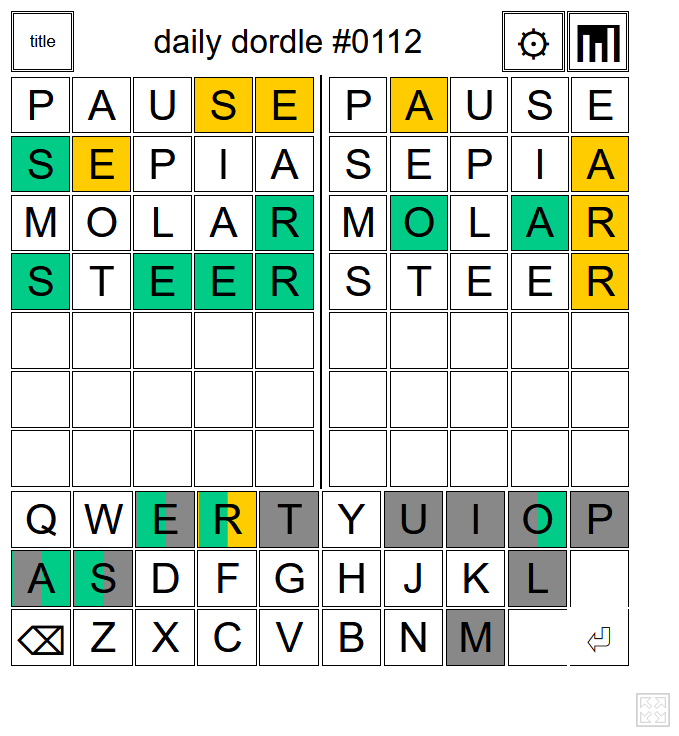
Dordle is two games of Wordle at once. You get seven guesses. Your guesses go into both puzzles. Its creator is on Twitter, they’re cool!
Not enough? Tridle is three games of Wordle at once; you get eight guesses.
You want still more? Sure, we’re all adults here. Quordle is four games of Wordle at once; you get nine guesses. You’ve probably picked up on the pattern here by now.
Beyond that? Absolutely, why should we be bound by the rules of the past? Octordle is eight games of Wordle at once, with 13 guesses.
You’re not yet satisfied? So we stray still further from divine grace. Okay, then, Sedecordle is 16 games of Wordle at once, with 21 guesses.
Even more? Let the angels weep then. Duotrigordle is 32 games of Wordle at once, with 37 guesses.
What? More, even than that? Why not, let’s abandon all the laws of heaven and earth. Sexaginta-Quattordle is 64 games of Wordle at once. It’s slightly more forgiving than the other versions, giving you 70 guesses instead of 69. Once you get to this scale, Wordle’s whole nature changes. After you use a couple of spare guesses to get some info about the words en masse, your aim is to try to correctly guess one word per turn, and use the information revealed by those guesses to solve the others.
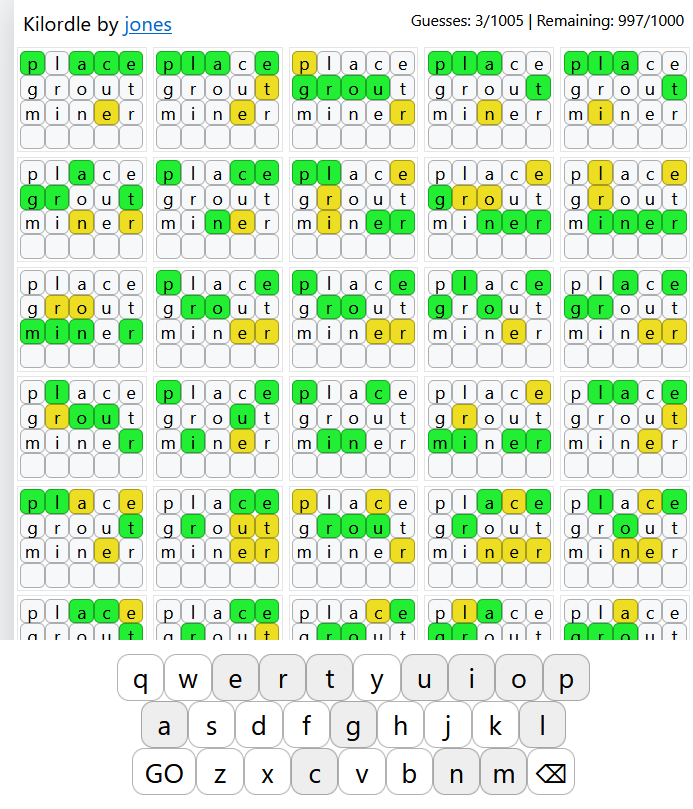
This brings us to Kilordle, 1,000 games of Wordle at once, with 1,005 guesses. This may sound just like an exercise in extremity, but some care was put into it: the puzzles you’re closest to finishing are sorted to the top, and solved ones are removed entirely. Also, you can get more than one word on a guess, since you’re awarded credit for words you have all green letters for. When you get near the end and single guesses can eliminate 20 words or more, it almost feels like a clicker game. When playing in bulk like this, your strategy tends to change to the general case: using every letter in every position in as few moves as possible. I’ve seen someone mention winning in as few as 75 moves this way, and a computer program probably could do it in even less, but writing software to play Wordle for you is discarding one of its chief virtues: that you don’t have to think too hard about it.
The Case of n=1
If you just want more than the daily Wordle, Wordle Unlimited (which I’m amazed hasn’t had its name changed) can provide that, as can WordPlay, and Word Master, and wordle.gg.
There used to be at least two sites that let you play past Wordle puzzles, but the New York Times requested they be taken down when they gained ownership of the original game and name. Boo, hiss!
If you want to play locally at a command-line, and have one of a couple of scripting languages installed, you can try wordle in Ruby or wordle-cli in Python.
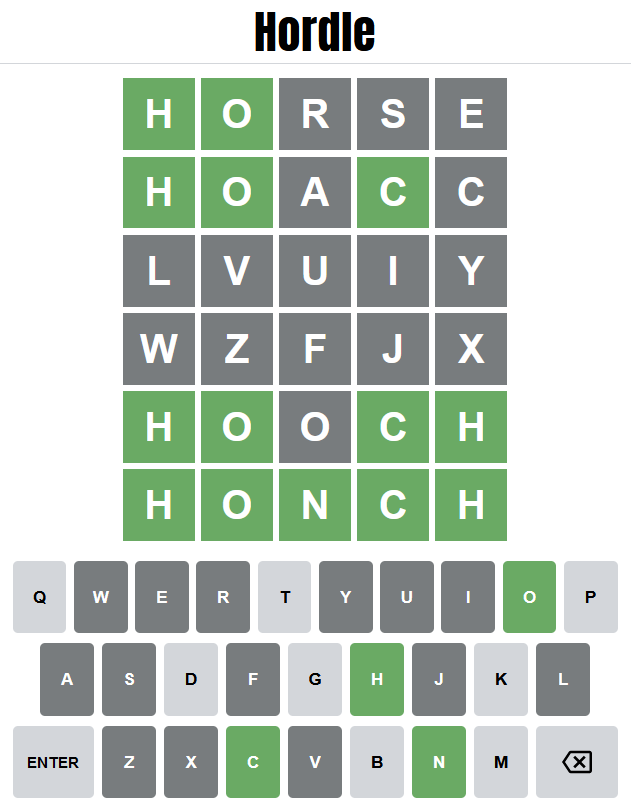
But what if you want to play in Urdu? Urdle. Chinese? This. Swedish. French. Or, without using the letter E. Or maybe one where the answers are all ludicrous misspellings of the word HORSE.
If you’re having trouble with basic Wordle, the New York Times has a bot that will look at your previous games and offer advice.
Mutations
These are Wordle, but changed, or with a special focus.
Hello Wordl lets you decide how many letters are in the answer. The daily game decides the number of letters for you.
Hurdle is a series of five Wordle puzzles. When you guess the answer to one, it becomes the first guess of the next. For the last puzzle, all four previous answers are automatically your first guesses, giving you two tries left.
Star Wordle‘s answers have a Star Wars theme, but you can still guess normal words to help with narrowing it down. Another version of the concept is SWordle. Along these lines is Lordle of the Rings. Wizarding Wordle, to Harry Potter.
Taylordle answers all refer to Taylor Swift in some way. Byrdle answers all relate to choral music. Gordle answers are all hockey players. Basketle answers are basketball players. Bikle, for cyclists.
Queerdle answers are from four to eight letters and are always LGBTQ+-related; guesses can be any word of the answer’s size. Phoodle has food and food-related answers, but guesses can be normal words. Lewdle has crude answers, and by default only accepts crude guesses, although this can be disabled. Similar to that is Sweardle.
Squabble is online-based battle royale multiplayer Wordle, where correct guesses become attacks against other players, and incorrect ones cause you damage.
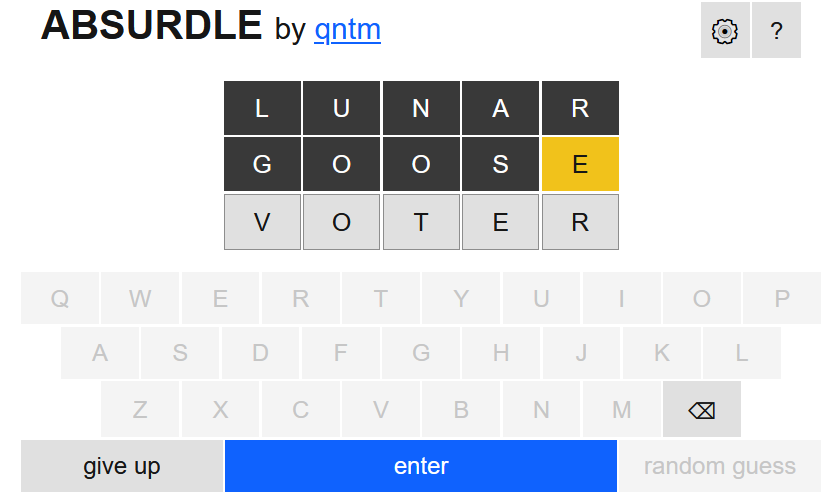
Absurdle changes the answer behind the scenes to be as difficult as possible. You still only get six guesses. Another version of the idea, which lets you decide on the word length, is Evil Wordle. Adverswordle plays a bit like that, but with the computer guessing and you giving it clues to matching a secret word you come up with, and can change if you want, so long as you don’t contradict yourself or make it impossible.
Luckle changes the answer behind the scenes to be as easy as possible. You get six guesses, but they won’t matter.
And now, it falls to my weary shoulders to inform you of the existence of Letterle. At least you get 26 guesses.
Variations
Like Wordle, but with extra stuff added.
Crosswordle gives you two words, that are related and cross at some point.
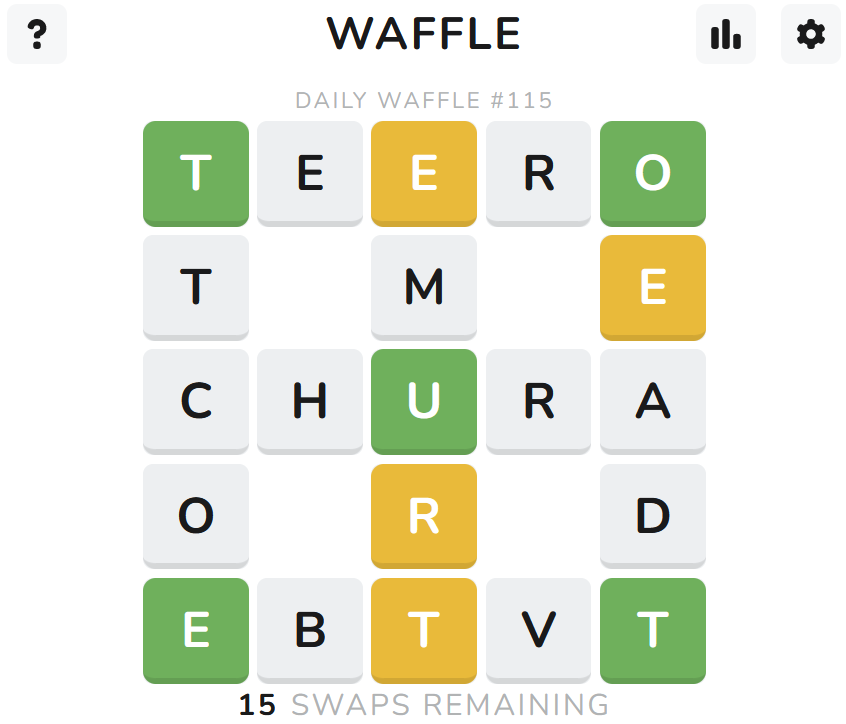
Waffle is Wordle, but with a grid of six words, and instead of guessing on a blank board, all the letters are given, but scrambled. A move consists of swapping two letters. You get 15 swaps; a perfect score is 10 swaps.
Scrabwordle gives you fewer guesses (depending on player-selected difficulty), but gives the secret word’s Scrabble score as a hint.
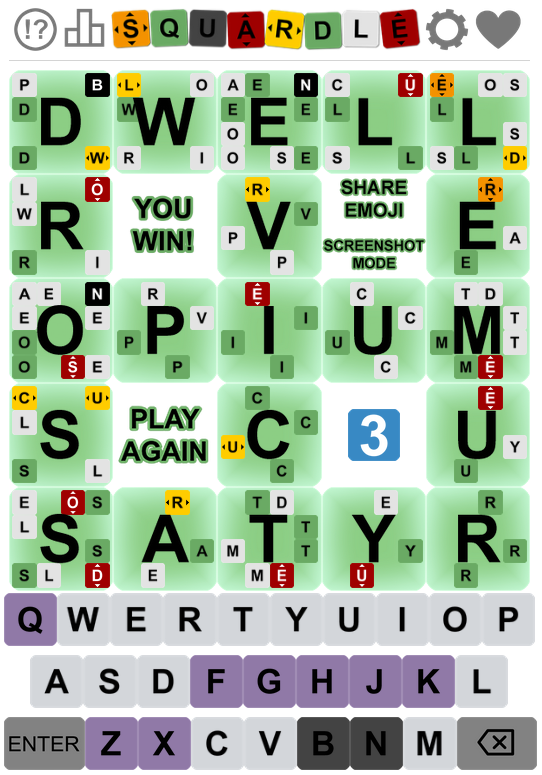
Squardle… okay, this is going to require some explanation. Squardle sets aside one of Wordle’s chief virtues, simplicity. It’s still fun, but a subtly different kind of fun. It has a grid like Waffle (see image of solved game to the right). You make guesses, but in turns, and along two lines at once: your first guess is along the top row and left column (DWELL and DROSS in the image). You always guess the same word in both. You’ll get clues along both lines based on your guesses (the small letters in the image, which accumulate as you guess). Yellow letters mean the letter can be found somewhere along the same row, and red letters are along the columns. Orange letters mean one of that letter can be found both vertically and horizontally, along both the row and column. Green letters are in the right place, as in Wordle. Notably black letters, the B and N in the shown puzzle, won’t be found anywhere, even in other words.
After you make your first guess, the second guess works the same way, but through the vertical and horizontal center (EVICT and OPIUM here), and the third guess hits the right-most column and bottom row (LEMUR and SATYR). After that, the guesses cycle through these three sets of positions.
Because of the increased complexity and your inability to make a guess over the whole puzzle at once, Squardle gives you ten guesses, you get an extra guess every time you get a word right, for up to 15 guesses in all, and, if you completely solve both the words at a given row/column pair, it’ll be skipped in rotation for the rest of the puzzle. If your head is swimming after all of that don’t feel bad, it’s definitely more complicated than Wordle, and it demands more from you. But, once you get underway, with careful thought the puzzle is still doable. For those who master it, there is a more difficult version, Weekly Squardle, with a total of ten words and starting with only six guesses.
Inspired-By
Not really like Wordle at all, but they still have daily puzzles.
Heardle challenges you to guess songs from a snippet. With each wrong answer the snipped gets longer. Those like me will be hopelessly lost.
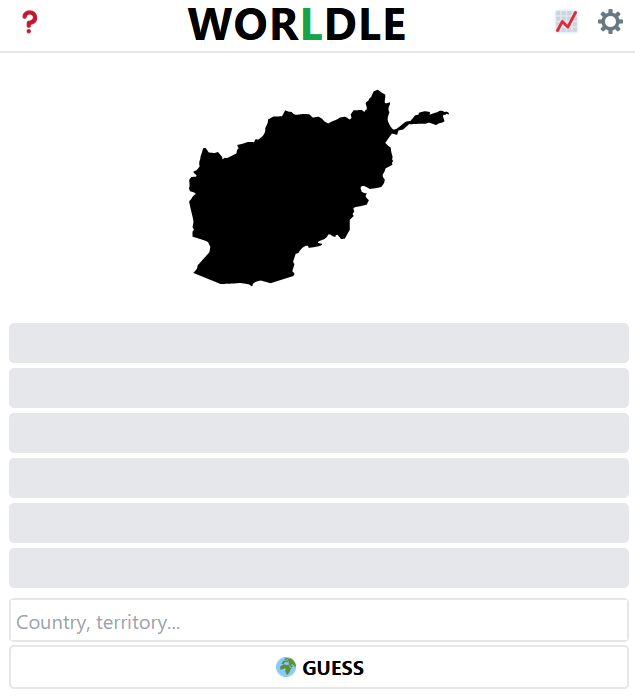
Worldle has you guessing a nation by its shape; the hints from incorrect guesses take the form of facts about the nation. Similar to that is Globle. And, down in Flaggle Rock, you guess the flags of countries and territories.
Who Are Ya? is a similar concept, but with portraits of football (a.k.a. soccer) players.
Framed asks you to guess a movie from stills, doled out one per guess.
Mathdle wants you to complete arithmetic number sentences. Nerdle is similar, as is Mathler. There is also Primle, where you have to guess a prime number. Also, Primel.
Subwaydle is of interest mostly to New Yorkers, challenging you guess a route between two given subway stations. MTRdle is the same, but for Hong Kong’s subway system.
Poeltl is basketball players again, but with game-related clues instead of the usual green/yellow/white letters.
Semantle tells you how close semantically, as judged by an algorithm, your guess is to the hidden word. There is no guess limit, but it’s very challenging, and guess counts of over 100 are frequent. Make sure you read the directions, as you might not be prepared for what semantic closeness means. Pimantle is the same idea, but with a cool visualization.
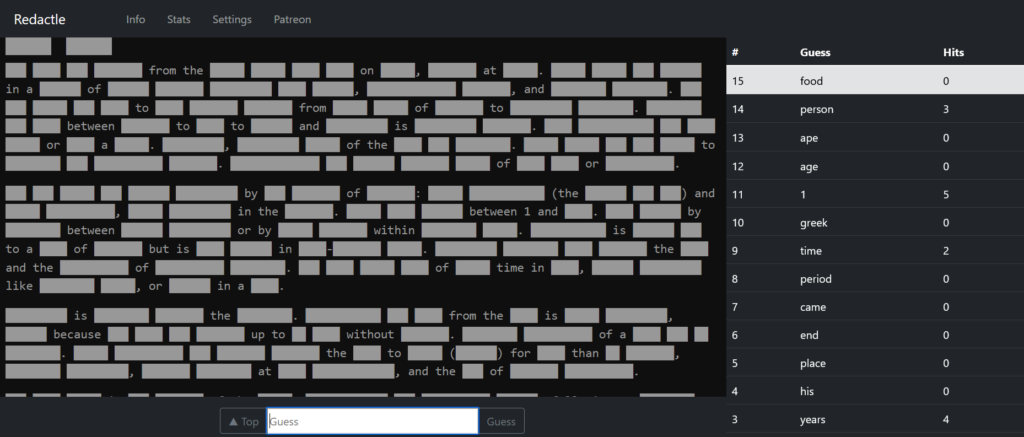
Redactle picks one of the top 10,000 most-notable Wikipedia pages, blacks out all but the most common words, and reveals them as you guess what they are. You win when you uncover every word in the page title. Like with Semantle, you aren’t limited in guesses but it’s still very hard. If the answer is outside your interests, you might end up making 200 guesses or more. This is one of those games where there’s a bit more to it than you might expect: the articles are in a monospace font, so you can reliably tell how long the blanked-out words are.
It predates Wordle so it’s not really inspired by it, but if you have a New York Times subscription you can play Spelling Bee, which asks you to come up with as many words from a set of seven letters as you can, provided they all contain a given key letter. You get more points for longer words, and a rating based on what proportion of that day’s maximum score you earn.
Is all this not enough? Is your lust not sated? This seems to be a canonical list of Wordle deviations, divergences, and disparities. And here is a chart to mark our journey together:
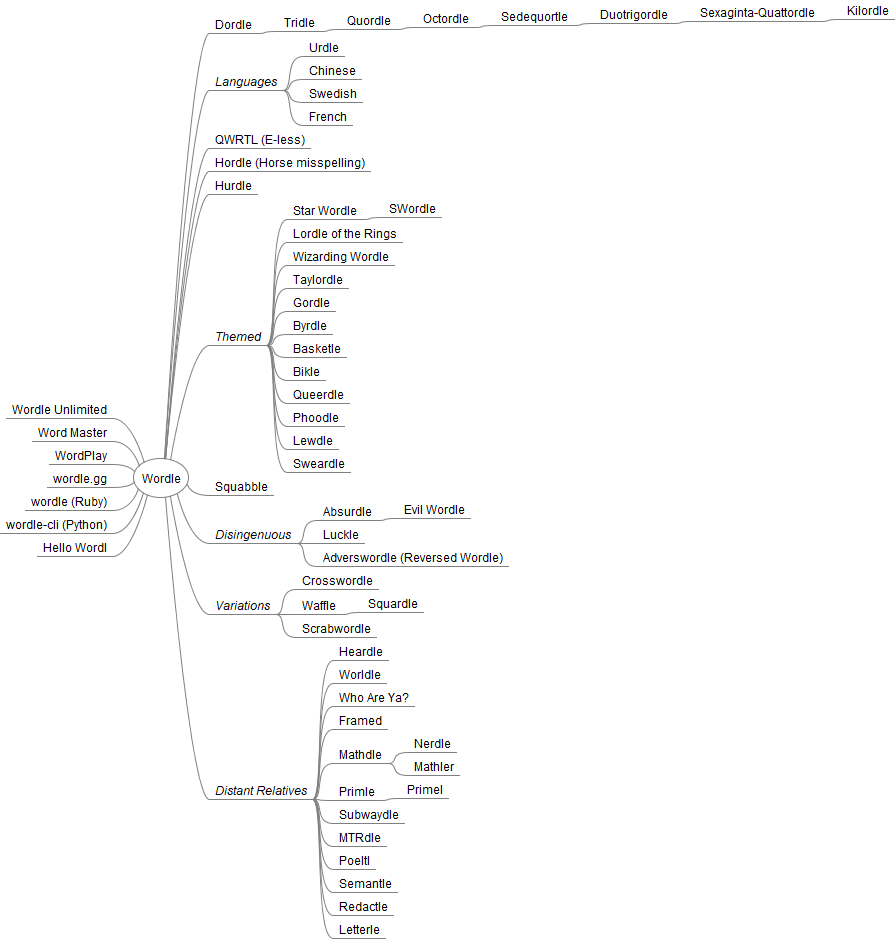
Ancient History
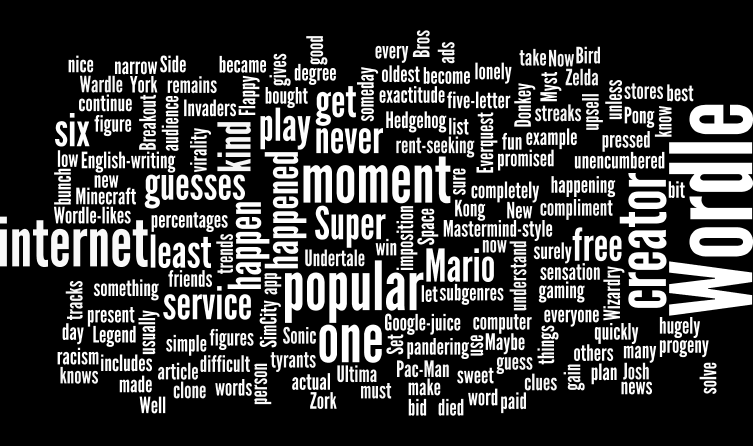
Did you know that wordle was once a term for a kind of word cloud, created by Jonathan Feinberg? There was a wordle.net and everything! It had a Metafilter post in 2008! It had a trademarked name! It was popular!
No one seems to remember it any more. Its site is dead. It was last seen alive in 2020. Finding out more is very difficult now because of the search static produced by its massively popular successor.
The existence and forgetting of first-Wordle should serve to remind us all: Internet fame is beyond fleeting. Wordle is known and beloved now, and since it’s owned by the New York Times is probably on track to staid, Jumble-like ubiquity. But these variants are not going to be around forever. Enjoy them while you can, for it’s just a matter of time before their domains all become just another tool in some nefarious SEO outfit’s Google-gaming schemes.
